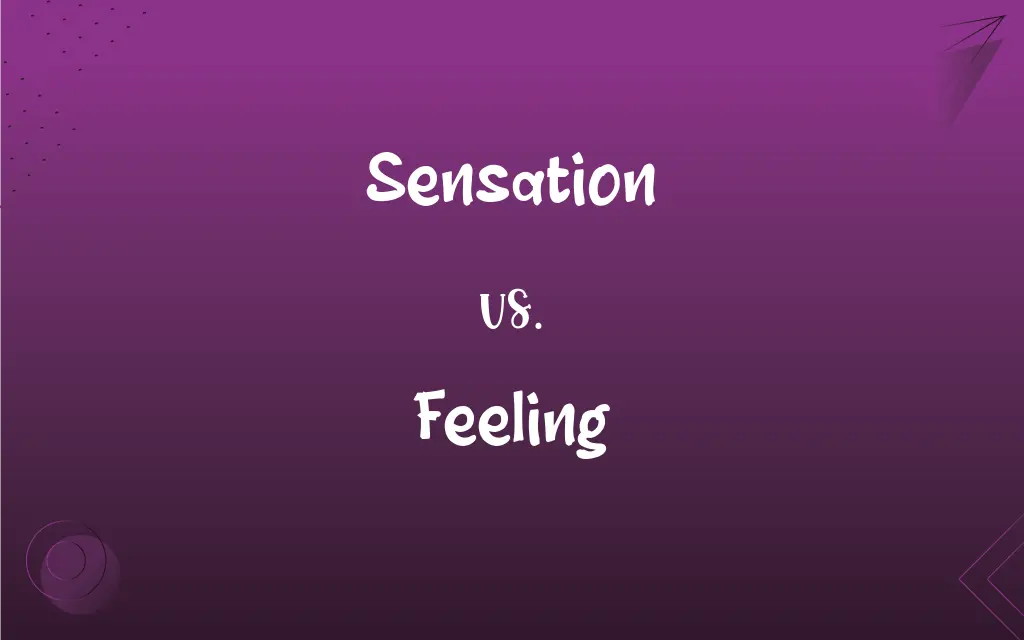Sensation vs. Feeling: What's the Difference?
Edited by Aimie Carlson || By Janet White || Published on December 28, 2023
Sensation is the physical process of sensing through touch, taste, sight, sound, and smell, while feeling is the emotional or subjective interpretation of these sensations.

Key Differences
Sensation refers to the physical experience of sensory information, such as touch or sound. Feeling, in contrast, is the emotional response to sensations or situations, like happiness or sadness.
Sensation is a biological process that involves the nervous system interpreting external stimuli. Feelings are psychological, involving emotional interpretation and internal mental states.
Sensations are objective, measurable responses to stimuli, such as the sensation of heat. Feelings are subjective, varying greatly between individuals, like feeling warm-hearted.
Sensation is an immediate, primary response to external stimuli. Feeling is a more developed, secondary response that involves emotional processing of the sensation.
Sensation is the detection and transmission of physical stimuli. Feeling encompasses the personal interpretation and emotional significance of those sensations.
ADVERTISEMENT
Comparison Chart
Nature
Physical process of sensing
Emotional or subjective interpretation
Biological Basis
Involves nervous system and sensory organs
Involves brain's emotional centers
Type of Experience
Objective and measurable
Subjective and variable
Response to Stimuli
Immediate detection of external stimuli
Developed emotional response to stimuli
Main Focus
Sensory information (touch, taste, etc.)
Emotional states (happiness, sadness, etc.)
ADVERTISEMENT
Sensation and Feeling Definitions
Sensation
A sensation can also refer to a strong impression made by something striking or novel.
The art exhibit created a sensation among the visitors.
Feeling
A feeling is an emotional state or reaction.
She had a deep feeling of joy seeing her friend after many years.
Sensation
Sensation is the immediate and direct response of the sensory organs to stimuli.
The sensation of cold water made her shiver as she dived into the pool.
Feeling
Feeling refers to an individual's subjective experience of emotions.
He had a strong feeling of nostalgia while looking at old photographs.
Sensation
A sensation is a physical feeling perceived through the sense organs.
The sensation of the sun's warmth on his skin was comforting.
Feeling
Feelings are often used to describe more complex emotional states like love, hate, or jealousy.
The feeling of love overwhelmed her as she looked at her newborn baby.
Sensation
Sensation refers to an awareness of bodily states or qualities of external objects.
The sensation of soft grass under her feet was soothing.
Feeling
A feeling can be a conscious perception of mood or atmosphere.
There was a feeling of excitement in the air as the concert began.
Sensation
In physiology, sensation is the process of receiving and transmitting sensory information to the brain.
The sensation of pain alerted him to the injury.
Feeling
Feeling denotes a physical sensation that is also perceived emotionally.
The feeling of warmth from the fireplace brought comfort on the cold night.
Sensation
A perception associated with stimulation of a sense organ or with a specific body condition
The sensation of heat.
A visual sensation.
Feeling
The sense of touch
Lost feeling in a toe.
Sensation
The faculty to feel or perceive; physical sensibility
The patient has very little sensation left in the right leg.
Feeling
A sensation experienced through this sense
Enjoyed the feeling of rain on my face.
FAQs
How do sensations occur?
Sensations occur through the sensory organs detecting stimuli and sending signals to the brain.
Are feelings always emotional?
Yes, feelings are typically emotional responses to stimuli or internal states.
Is pain a sensation or a feeling?
Pain is a sensation, and the discomfort it causes is a feeling.
What is a sensation?
A sensation is the direct response of the sensory organs to external stimuli.
Are sensations always conscious?
Most sensations are conscious, but some can occur subconsciously.
Is intuition a feeling or a sensation?
Intuition is more of a feeling, a subconscious synthesis of experiences and insights.
Can feelings be controlled?
While it's hard to control feelings directly, one can manage reactions to them.
What does feeling mean?
Feeling refers to the emotional or subjective interpretation of sensations or situations.
Can sensations exist without feelings?
Yes, sensations can be purely physical without associated emotional feelings.
Can animals experience sensations and feelings?
Animals can experience sensations, and it is believed they have feelings too, though not identical to human emotional states.
What role do sensations play in perception?
Sensations are fundamental to perception, providing the raw data for interpretation.
How do individual differences affect feelings?
Individual experiences, culture, and personality can significantly influence how feelings are experienced and expressed.
What is the difference between a feeling and a mood?
A feeling is a specific emotional response, while a mood is a longer-lasting emotional state.
What is an example of a complex feeling?
Love is an example of a complex feeling, involving various emotional and cognitive components.
How do feelings influence behavior?
Feelings can greatly influence behavior by motivating actions or responses.
Do feelings always result from sensations?
Feelings often result from sensations but can also arise from thoughts or memories.
Can sensations be misleading?
Yes, sensations can sometimes be misleading, as in optical illusions.
How are sensations processed in the brain?
Sensations are processed in the brain through the sensory cortex and associated areas.
Are all sensations physical?
Yes, sensations are physical responses of the sensory organs to stimuli.
Can feelings be described in words?
Feelings can be challenging to describe in words but are often expressed through language, art, or behavior.
About Author
Written by
Janet WhiteJanet White has been an esteemed writer and blogger for Difference Wiki. Holding a Master's degree in Science and Medical Journalism from the prestigious Boston University, she has consistently demonstrated her expertise and passion for her field. When she's not immersed in her work, Janet relishes her time exercising, delving into a good book, and cherishing moments with friends and family.
Edited by
Aimie CarlsonAimie Carlson, holding a master's degree in English literature, is a fervent English language enthusiast. She lends her writing talents to Difference Wiki, a prominent website that specializes in comparisons, offering readers insightful analyses that both captivate and inform.






































































